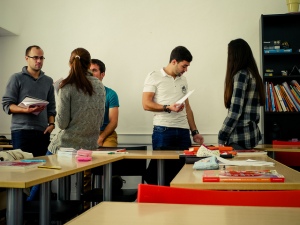Cats and dogs as parents
On one level, this is just a funny clip about the differences between cats and dogs. On another level, it says something about parenting and how we teach our children to view the world.
The dog in this clip patiently encourages its young, never far away while the puppy attempts to descend the scary staircase.
The cat just pushes its kitten down the stairs.
Of course, we only see the cats briefly. The mother cat may have tried the other options first.
I remember gently but firmly pushing my daughter (then aged about 8) onto a chairlift because I’d tried all the encouraging talk and she was still hesitating. I knew she was a child who sometimes did just need a push to try something new.
Teachers sometimes see parents who act a bit like the dog mother as she tries to walk down the stairs over the top of the puppy – helicopter parents or smother mothers – who try to shield their child from everything that could go wrong and rescue them from their bad decisions so that they never have to face the consequences.
They justify their actions to themselves and others as just protective parenting. They say that they are only seeking justice and fairness when they question why their child is being punished for something he or she did at school or why he or she didn’t get a better mark for a piece of assessment.
It’s true that teachers sometimes make unfair judgements – usually in the absence of all the evidence. It’s true that marking across classes and schools is not completely equal, no matter how hard we try. Occasionally even the most reserved parent needs to step in and ask questions. Teachers, however, are professionals who in most cases make decisions thoughtfully.
It’s also true that as parents we generally want to believe that our children would not do the wrong thing – not punch a classmate, not lie to a teacher about what happened in the playground, not break the school rules –but if we are honest we have to admit that children (just like adults) sometimes make bad choices.
We will not always be there to rescue our children from the consequences of their actions. If my adult daughter gets angry with her boss and swears at her and gets fired, I can’t step in to complain that she was provoked and the boss is unfair. If my adult son doesn’t get the promotion he really wanted because he hasn’t been working as hard as someone else, it will do me no good to ring the employer and argue about why he deserves to get it.
And sometimes, life is just unfair. People invest money which is subsequently lost by the actions of con artists or the whims of the stock market; women who have done nothing wrong suffer domestic violence; jobs can be hard to find; people contract chronic or terminal diseases.
Children need to start developing resilience while they are young and part of that is learning how to cope with the knocks, setbacks and disappointments that life brings – deserved or undeserved.
It is said that it takes a village to raise a child. Once we have found the village to help us raise our children, we parents need to place some trust in the other members of that village. Sometimes they might push our kitten down the stairs (metaphorically, not literally!) but maybe that is what our kitten needs.
